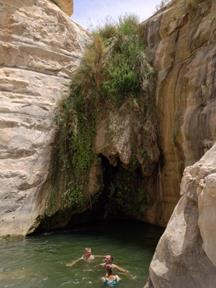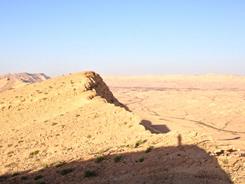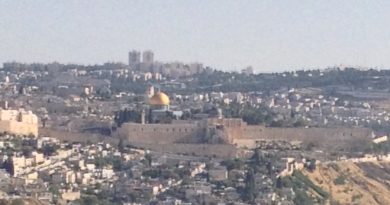Bamidbar 5774 – Finding God in the Wilderness
And the Lord spoke to Moses in the wilderness of Sinai …Numbers 1:1
Regular readers of this blog know that I’ve been spending a lot of time in the desert lately. My 35th day on the Israel Trail, back in February, was my first “real day in the desert.” I’ve now spent 8 days on the trail since then traversing the harsh Negev desert from Arad to past Mitzpe Ramon. Even though I’ve spent time in deserts before – I even lived in Arizona for a few months – it’s different now. I’ve run or hiked a couple of hundred kilometers through the desert, I’ve slept under the stars. I have a completely different understanding of the desert than I did a few a months ago.
My time in the desert has helped me understand why God so often seems to speak to people when they are in the wilderness. This week’s Torah portion, the first parsha in the book of Numbers, opens with God speaking to Moses in the wilderness of Sinai. In Hebrew this entire book of the Bible is called “Bamidbar,” which means “in the wilderness.” In Kings I, the prophet Elijah flees into the desert outside Beersheva where God appears to him:
And he [the word of the Lord] said, Go out, and stand upon the mount before the Lord. And, behold, the Lord passed by, and a great and strong wind tore the mountains, and broke in pieces the rocks before the Lord; but the Lord was not in the wind; and after the wind an earthquake; but the Lord was not in the earthquake; And after the earthquake a fire; but the Lord was not in the fire; and after the fire a still small voice.
I think there are a couple of reasons why it’s easier to find God in the desert. It’s not because there is more “God” there – after all, as the prophet Isaiah said, m’lo kol ha’aretz k’vodo, the whole world is full of His glory. God is everywhere, there is no place devoid of Her presence. It’s we who are different – more receptive.
Look at the description of how Elijah encountered God – it wasn’t in the wind, the earthquake, or the fire. It was the “still small voice.” Our cities, our lives, are often too busy to hear the “still small voice” of God. Real quiet is conducive to being aware of God’s presence. Nowadays, not all of the desert is quiet. The northern part of the Negev was pretty noisy – birds, bugs, planes, helicopters, shepherds yelling or singing at their sheep. My most recent chunk of the Negev, Makhtesh Ramon, was pretty noisy with F16s having fun buzzing the crater. And sometimes we bring our own noise. When I’m hiking or running on “flat boring parts” I often listen to rock or pop music cranked up. But there are also places of profound silence and profound beauty.
A few weeks ago I did the first section of the trail where I used a backpack and slept out in the desert. My daughter Katherine came along. It was an amazing experience. You can read about it here. After setting up camp, fixing dinner, etc., we got into our sleeping bags by around 9pm, and I felt it was the quietest place I had ever been in my entire life. It was eerily quiet. The only thing I could hear was the ringing in my ears. No cars or planes, no birds, no bugs, no animals, nothing. At first the moon was out and things were pretty bright, but when I woke up in the middle of the night the moon had set and the stars were just unbelievable. The only other time I’ve seen as many stars was when I was flying a small plane over the Arizona desert at night on a moonless eve and I turned the cockpit lights all the way down. It was definitely easier to somehow feel the presence of God among the stars and in the silence.
In the desert one can also feel more vulnerable – and therefore dependent on God. God’s presence literally hovered over the Israelites during their trek across the desert – in a pillar of cloud by day and a pillar of fire at night. Several times in the Torah the people run out of water and complain. They complain about the rations. In the book of Samuel when David is quashing a palace coup being staged by his son Absalom they went into the desert and we’re told “The people are hungry, and tired, and thirsty, in the wilderness.”
The desert is a harsh place. Even with modern equipment such as GPS and a 3-liter bag of water in the backpack you can get in trouble. Katherine and I ran low on water because it was hotter than we expected and we didn’t bring quite enough. We called for help and  got picked up 9km short of our goal – we were “hungry, and tired, and thirsty, in the wilderness.”
got picked up 9km short of our goal – we were “hungry, and tired, and thirsty, in the wilderness.”
And there’s also nothing quite like the feeling of coming across an oasis in the desert, a place like Ein Akev, where there is fresh, cool, clear water in the middle of the desert. Such a place does feel like a miracle – a gift from God.
Since God is everywhere, it’s possible to encounter God anywhere. I’ve felt a connection to God in synagogues, living rooms, hospitals, cars, and planes. But there is something special about the desert.


